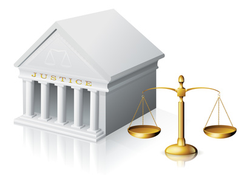April 30, 2025
Thesaurus : Doctrine

► Full Reference: A. Nicollet, "La charge du devoir de vigilance sur les entreprises s'inscrivant dans les chaines de valeur(The burden of Vigilance Duty on companies in value chains)", in M.-A. Frison-Roche (ed.), L'Obligation de Compliance, Journal of Regulation & Compliance (JoRC) and Dalloz, coll. "Régulations & Compliance", 2025, to be published.
____
📕read a general presentation of the book, L'Obligation de Compliance, in which this article is published
____
► English summary of this contribution : This article identifies the factors that lead to companies being held liable under the Vigilance Duty for which they are responsible. The first element is the notion of "chain", a new concept for the Law that has been incorporated into the legal system (I). This may be explicit or implicit, referring to the value chain, the activity chain or the supply chain. These vocabulary variations, depending on the texts and national laws, are aimed at cases where there is no overlap, but the duty of vigilance is transparently aimed at the value chain of which the others are part. The concept of the "chain" could therefore play an increasingly important role in Economic Law, in that it is its very existence that gives rise to a duty of vigilance on the part of the company that governs the structure of the chain.
The second part of the article shows that this Vigilance Duty places a shared burden on the companies in the chain. Indeed, while the company that is the master, either through corporate techniques or because it governs the structure of the chain more factually, must always fulfill this obligation, the companies along the chain cannot be relieved of it. The burden is cumulative, as stated in German legal system, but this principle should be generalised: performance may be joint, articulated, and performance by one may presume performance by the other, the obligation of the other may be performed by the other, but this does not amount to exemption. This concept allows for a global group policy without destroying the effectiveness of the Compliance Obligation.
Indeed, and this is the third part of the article, Liability is cumulative. The master company's liability is personal and it must not be able to shirk it. The companies in the value chain, while benefiting from a presumption of conformity by the very fact of the chain phenomenon and the multiple contracts and corporate shareholdings that structure it, are also liable if they fail in their Duty of Vigilance. National legislation varies widely in terms of the extent of liability incurred, with some not addressing the issue at all while others go into great detail, but they are not intended to call this principle into question.
________
Feb. 2, 2023
Publications

🌐 follow Marie-Anne Frison-Roche sur LinkedIn
🌐subscribe to the Newsletter MAFR Regulation, Compliance, Law
____
► Full Reference: M.-A. Frison-Roche, "Le juge, l'obligation de compliance et l'entreprise. Le système probatoire de la Compliance" ("The judge, the compliance obligation, and the company. The Compliance probationary system"), in M.-A. Frison-Roche (ed.), La juridictionnalisation de la Compliance, coll. "Régulations & Compliance", Journal of Regulation & Compliance (JoRC) and Dalloz, 2023, p 409-442.
____
📝read the article (in French)
____
🚧read the bilingual Working Paper which is the basis of this article, with additional developments, technical references and hyperlinks
____
📕read a general presentation of the book, La juridictionnalisation de la Compliance, in which this article is published
____
► Summary of the article (done by the Journal of Regulation & Compliance): the article aims to identify the link that must be established between the company in its relationship with the compliance obligations it assumes and the judges to whom it is accountable in this respect: this link is established by evidence. The evidentiary system of proof has yet to be constructed, and it is the purpose of this long study to lay the groundwork.
To this end, the article begins with a description of what is designated here as the "probatory square" in a "probatory system" that is superimposed on the system of rules of substantive legal system. This is all the more important because Compliance seems to be in frontal collision in its very principles with the general principles of the evidentiary system, in particular because it seems that the company would have to prove the existence of the Law or that it would have to bear in a definitive way the burden of proving the absence of violation, which seems to be contrary not only to the presumption of innocence but also to the principle of the freedom of action and of undertaking. In order to re-articulate Compliance Law, the obligations of compliance which legitimately weigh on the company, it is necessary to return to the probatory system specific to Compliance, so that it remains within the Rule of Law. This presupposes the adoption of a substantial definition of Compliance, which is not only compliance with the rules, which is only a minimal dimension, but implies that Compliance Law should be defined by the Monumental Goals on which the public authorities and the companies are in substantial alliance.
The evidentiary system of principle makes play between its four summits that are the burden of proof, the objects of proof this evidentiary square of principle, between the burden of proof, the means of proof and their admissibility. Compliance Law does not fall outside this evidential square, thus marking its full membership of the Rule of Law
In order to lay the foundations of the evidential system specific to Compliance Law, the first part of the article identifies the objects of proof which are specific to it, by distinguishing between the structural devices, on the one hand, and the expected behaviours, on the other. The first involves proving that the structures required to achieve the Monumental Goals of Compliance have actually been put in place. The object of proof is then the effectiveness of this implementation, which presents the effectiveness of the system. As far as behavioral obligations are concerned, the object of proof is the efforts made by the company to obtain them, the principle of proportionality governing the establishment of this proof, while the systemic efficiency of the whole reinforces the evidential system. However, the wisdom of evidence lies in the fact that, even though the principle remains that of freedom of evidence, the company must establish the effectiveness, efficiency, and effectiveness of the whole, independently of the burden of proof.
The second part of the article concerns those who bear the burden of proof in Compliance Law. The latter places the burden of proof on the company in principle, in view of its legal obligations. This burden comes from the legal origin of the obligations, which blocks the "round of the burden of proof". But in the interference of the different vertices of the evidentiary square, the question becomes more delicate when it comes to determining the contours of the compliance obligations that the company must perform. Moreover, the burden of proof may itself be the subject of proof, just as the company's performance of its legal obligations may also be the subject of contracts, which brings us back to the evidentiary system ordinarily applicable to contractual obligations. The situation is different when it comes to a "compliance contract" or when it comes to one or more compliance stipulations, concepts that are still not very well developed in Contract Law.
Furthermore, as all branches of Law belong to a legal system governed by the Rule of Law, other branches of law interfere and modify the methods and solutions of proof. This is the case when the fact, which is the object of proof, can give rise to a sanction, the Law of repression imposing its own solutions in the matter of the burden of proof.
In the third part of the article, the relevant means of proof in Compliance Law are examined, used in that Compliance Law is above all a branch of Law whose object is on the one hand information and on the other hand the Future. Open questions remain, such as whether companies could be forced by the Judge to build technologies to invent new means of proof. To show that they are indeed achieving the Monumental Goals they are charged with.
In the fourth part, the vital character of the pre-constitution of evidence is shown, which is the reflection of the Ex-Ante nature of Compliance Law: evidence must be pre-constituted to avoid the very prospect of having to use it, by finding all the means to establish the effectiveness, efficiency and even the effectiveness of the various Compliance Tools.
If companies do all this methodically, the Compliance evidence system will be established, in harmony with the general evidence system, Compliance Law and the Rule of Law.
________
April 16, 2018
Blog

It is about a particular case that one can rephrase the general questions. If the case is hot, it is even more important to return to the general questions, which are always colder (more boring, too).
Thus, Cambridge Analytica is a case of which everyone speaks a lot ... It is at the same time particular and very burning.
So we talk about it a lot, and with vehemence, and in a way often definitive, as well in attack as in defense.
For the prosecution, there are many advocacies, gathered for example in the Guardian's files.
For the defense, we find less. But one can read for example the article that has been published in early April 2018: Why (almost) everything reported about the Cambridge Analytica Facebook 'hacking' controversy is wrong.
The number of comments, and their more or less inflamed nature, in any case always definitive, does not mean anything in itself.
The regulators took the floor a little later, both in a more concrete way, the "group of 29" (bringing together all the European Regulators personal data) establishing the 11 April 2018 a working group on this subject and publishing April 10, 2018 new guidelines on the place that must be made to "consent".
But for the moment, if we loof at the media, it looks like a trial, because everyone claims to be entirely right and pretends that the other is entirely wrong. Trial to break the truth and virtue, say the accusers. Trial in witchcraft, says Facebook. And it's always up to us.
Because all this is probably due to the fact that we are no longer spectators: we are placed in the judge's position. The financial market was the first judge. It has already condemned. Without really trying to find out. This is because the public good of the financial markets is Trust, it is enough that one can even suspect the wife of Caesar, and so it is not really matter of truth of the facts and goof application of Rule of Law.
For the public opinion that we are, this is something else, because we could wait to know more. And we should, since we seek to remain a little attached to the "truth " of the facts and respect for the Rule of Law. However, this case is complex and is above all a matter of judicial analysis which will come and which we cannot lead ourselves, both in terms of the facts-which are complex-as well as the rules of law to be applied which are equally so.
What turns us into a court, an ordinary sociological phenomenon, is a new legal mechanism: the "whistleblower". By nature, it gives the bonus to the Attack
This logic of the legal mechanism of the whistleblower, a movement of fact to throw facts as one throws a buoy outside but one could also say stones on the firm that the insider denounces, logic today encouraged and protected by the Law, allows a person who knows something, most often because he participated, to let everyone know, without a filter. To denounce it. For the public good..
The successive texts on the whistleblower are nrms of a Compliance Law
The case is exemplary of this, since Facebook is "denounced" only in second place, behind Cambridge Analytica, but the notoriety and power of the first makes that it is hit first. French law in the so-called "Sapin 2 Act " of 2016 has ensured to protect the company denounced, but British and American Law are more violent, probably because they encourage more the private enforcement.
Temporality is therefore favorable to the attack. The time of the defense is always slower. It is usually the people in situations of weakness who suffer it: slowness of justice, justice outside courthouses, etc. With Compliance mechanisms, it is probably the very powerful who will live this. It is not a matter of rejoicing: the misfortune of some (here the difficulty of a company hasty "judged") does not console in any way the misfortune of others (the difficulty of ordinary beings accused or having only the right to protect themselves to reach concretely a judge and really get a judgment executed, even as they are in their right).
But if we go to general questions, since on the facts of this case we don't have the means to appreciate them, nor on the rules which apply to them, we cannot apply them in an adequate way until a court will have exercised its office?
However, the general perspectives highlighted by this singular case are two orders: Probationary order (I) and Accountability order (II).
Read below.
Frison-Roche, M.-A., Compliance Law, 2016.
On this notion, Frison-Roche, M.-A., From Regulation Law to Compliance Law, 2017.
Jan. 14, 2015
Blog

Oublions un instant l'objet même de l'arrêt AZF et limitons la lecture à la question procédurale tranchée par l'arrêt rendu par la chambre criminelle de la Cour de cassation le 13 janvier 2015.
Celui-ci est très remarquable et mérite pleine approbation en ce qu'il affirme l'obligation des juges de respecter l'impartialité de l'institution juridictionnelle, mise à mal si les personnes qui ont à faire à elle peuvent établir un "doute objectif" concernant l'impartialité d'un juge.
A travers cette affirmation, c'est un jeu de présomptions, la principale étant la présomption de l'impartialité du juge, que la Cour de cassation établit, mettant en juste mesure les charges et les objets de preuve en la matière.
Lire ci-dessous un commentaire développé de l'arrêt.
Updated: July 31, 2013 (Initial publication: Sept. 20, 2011)
Teachings : Les Grandes Questions du Droit, semestre d'automne 2011
